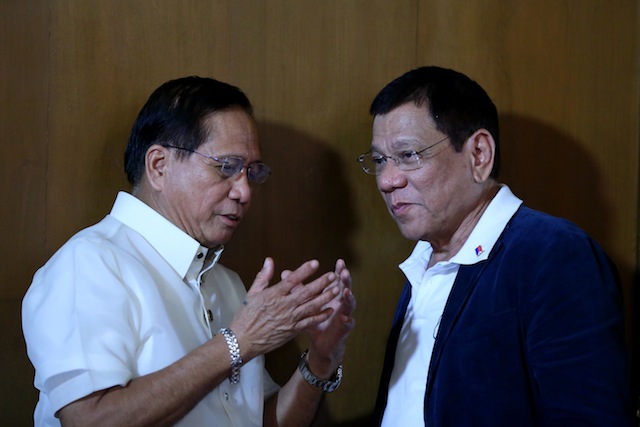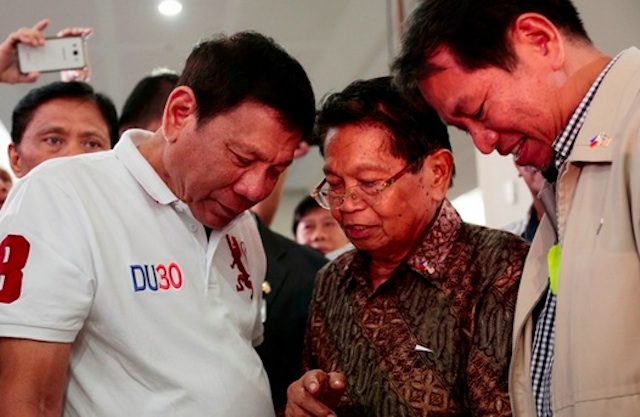DAVAO CITY (MindaNews/19 July) – The roadmap to peace under the Duterte administration will neither be “federalism first and Bangsamoro Basic Law (BBL) if it is rejected,” nor “basic law first and federalism later” — but “simultaneous,” Presidential Adviser on the Peace Process Jesus Dureza said.
“Simultaneous but enabling law obviously ahead. Bangsamoro governance unit can be a test bed for future federal states,” Dureza told MindaNews in a text message Tuesday noon.
President Rodrigo Duterte on Monday night approved the comprehensive peace roadmap that Dureza proposed to “address the Bangsamoro issue, the impending resumption of peace negotiations with the CPP/NPA/NDF (Communist Party of the Philippines/New Peoples Army/National Democratic Front) and the implementation of closure agreements with other rebel groups in the country.”
 President Rodrigo Duterte speaks with Secretary Jesus Dureza of the Office of the Presidential Adviser on the Peace Process after the presentation of the Peace Roadmap at the State Dining Room of the Malacañan Palace on Monday evening, July 18, 2016. ACE MORANDANTE/PPD
President Rodrigo Duterte speaks with Secretary Jesus Dureza of the Office of the Presidential Adviser on the Peace Process after the presentation of the Peace Roadmap at the State Dining Room of the Malacañan Palace on Monday evening, July 18, 2016. ACE MORANDANTE/PPD
The policy of “simultaneous” pushing for an enabling law that would pave the way for the creation of the “Bangsamoro,” a new autonomous political entity that would replace the Autonomous Region in Muslim Mindanao (ARMM), and working on the shift to a federal form of government for the entire nation, puts to rest the confusion generated by the pronouncement of the President during the Mindanao Hariraya Eid’l Fitr on July 8 that he will push for federalism first but if the Filipino people would reject it in the plebiscite, “then I am ready to concede whatever is there in the (proposed) BBL.”
“We will see to it that it will pass,” he said.
The statement triggered confusion because during his campaign, Duterte promised the Moro Islamic Liberation Front (MILF) Central Committee whom he visited in Camp Darapanan on February 27 that since the shift to federalism might take long, he will push for the passage of the BBL first and make it a template for federalism. MILF chair Al Haj Murad Ebrahim told MindaNews this was repeated by Duterte during their one-on-one talk in Davao City on June 17.
The approved Bangsamoro peace roadmap hews closer to the original pronouncement of Duterte, the country’s 16th President and the first Mindanawon to lead the nation, on how he would address the historical injustices committed against the Bangsamoro.
He is the seventh President since Ferdinand Marcos who will attempt to finally settle the Bangsamoro Question through a peace process.
2 peace agreements
Peace negotiations with the Bangsamoro fronts are over but implementation of the peace agreements is not yet over.
Duterte inherited two peace agreements from previous administrations: under Fidel Ramos, the 1996 Final Peace Agreement (FPA) with the Moro National Liberation Front (MNLF) that started with the 1976 Tripoli Agreement under Marcos, and under Benigno Simeon Aquino III, the 2014 Comprehensive Agreement on the Bangsamoro (CAB) with the MILF.
The 1996 FPA has three major provisions that the MNLF claims have not been implemented while the 2014 CAB is still on its second year of implementation, the roadmap bogged down by the failure of the previous Congress to pass the BBL.
Under the Duterte roadmap, work on the new proposed Bangsamoro enabling law “will be done simultaneous with the moves to shift to a federal set-up, the latter expected to come later under the planned timeline,” a press release from the Office of the Presidential Adviser on the Peace Process (OPAPP) said.
An all-Moro body will be set up to “draft anew a more inclusive proposed enabling law that will be filed with Congress” in lieu of the BBL that was not passed.
The new draft envisions the “consolidation and/or convergence” of the various peace agreements already entered into – the CAB, the FPA, “including relevant provisions” of RA 9054 or the law governing the Autonomous Region in Muslim Mindanao (ARMM) and the Indigenous People’s Rights Acts (IPRA).
 President Rodrigo Roa Duterte, Ghazali Jaafar, 1st vice chair of the Moro Islamic Liberation Front and Atty. Randolph Parcasio, spokersperson of the MNLF under Nur Misuari, during the Mindanao Hariraya Eid’l Fitr in Davao City on July 8, 2016. RENE B. LUMAWAG / Presidential Photographers Division
President Rodrigo Roa Duterte, Ghazali Jaafar, 1st vice chair of the Moro Islamic Liberation Front and Atty. Randolph Parcasio, spokersperson of the MNLF under Nur Misuari, during the Mindanao Hariraya Eid’l Fitr in Davao City on July 8, 2016. RENE B. LUMAWAG / Presidential Photographers Division
MILF chair Al Haj Murad Ebrahim told MindaNews last month that the draft BBL submitted to Congress in 2014 will be “improved” through a convergence of the provisions of the 2014 CAB and the 1996 FPA before it is presented to the 17th Congress, through the Bangsamoro Coordination Forum that the 57-nation Organization of Islamic Cooperation initiated to “harmonize the two peace tracks.”
MNLF in BTC
The all-Moro body that will draft the proposed enabling law will still be the Bangsamoro Transition Commission ( BTC) as provided for in the CAB but the MILF-led joint GPH-MILF body that drafted the BBL will be “reconstituted” with representation from the “MILF, MNLF, the ARMM and other Bangsamoro representatives.”
Dureza told MindaNews that the BTC will still have the same number — 15 — with eight nominated by the MILF and seven nominated by the government. But the government nominees, he said, will now be more inclusive.
In choosing the seven nominees of government, “we will first consult with (MNLF founding chair) Nur (Misuari) et al on composition from his side. ARMM and Lumad din,” Dureza said.
“The reconstituted and inclusive BTC will also be mandated to propose amendments to the Philippine Constitution that are pertinent to the Bangsamoro as inputs towards eventual federalism in the land,” the OPAPP press release said.
The BTC drafted proposed amendments to the 1987 Constitution but did not include this in the draft BBL that it submitted to Congress in September 2014.
Congress in
Incoming Senate President Aquilino Pimentel III and incoming House Speaker Pantaleon Alvarez attended the Malacanang meeting Monday night, expressed support for the peace roadmap.
Dureza told Malacanang reporters Tuesday afternoon that getting the two leaders of Congress into the peace roadmap is important because it is Congress that will pass the enabling law for the Bangsamoro.
“Putting already the legislative (in the process) will shorten this effort,” he said.
“If it proceeds as envisioned,” Dureza explained, the enabling law that will be passed “can also be a pilot federal state of the Bangsamoro as we move towards a nationwide federal set up later on.”
“As you very well know, the time (for the federal set up) is a little longer.
Development projects in
Alvarez and Senate President Franklin Drilon filed a Resolution of Both Houses calling for a Constitutional Convention, the election of which is being eyed for January 2017.
The proposed plebiscite to ratify the new Constitution is May 2019, simultaneous with the midterm elections.
While the passage of a Bangsamoro law and the shift to federalism are being done simultaneously, Dureza said government will also implement “massive development on the ground.”
“I can sign a hundred peace agreements but if those on the ground do not immediately feel the dividends of peace, those agreements will not be sustainable,” Dureza said.
The OPAPP press release said Duterte issued a directive to amend the executive order on the OPAPP to allow it to oversee development projects related to peace. (Carolyn O. Arguillas / MindaNews)